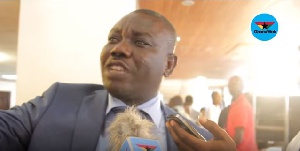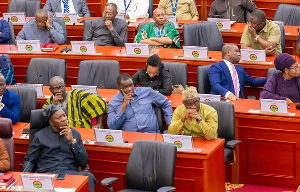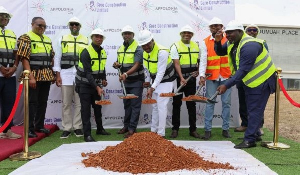Dear Mr. Isaac Adongo,
I have read your letter to the Governor of the Bank of Ghana, which has been widely circulated on social media, with a high degree of righteous indignation.
Why would I say that? First as a member of parliament, you should know that there are standard processes and procedures for demanding information or clarification from the central bank, that is, if the locus is there at all. Clearly, this does not include writing open and rude letters to the Governor and publishing it widely on social media.
Second, I am very disappointed with the tone and the inherent rudeness of your letter, which should not be part of the job description of an “honourable” Member of Parliament. You should know by now that monetary policy is not conducted on social media. Next time, I will advise you to go through your parliamentary processes to make any official requests and be civilized about how you go about it.
Ideally, I should have ended my commentary on your letter here, but since you have decided to stray into matters for which you are completely uneducated, let me take this opportunity to educate you.
Reserve Assets (Gross international reserves) are the total of Foreign Assets that are readily available to and controlled by the Monetary Authorities (in the case of Ghana, the Bank of Ghana) in different forms. These include cash with correspondent banks, bonds, securities, special drawing rights held with the IMF, gold etc. The concept of Net International Reserves (NIR) is to assess how much of total foreign reserves are available to be used by the country should there be any crisis.
To make this assessment, foreign assets that are encumbered are excluded from the computation of NIR. From the above, let me then educate you on the treatment of the Petroleum Holding Funds (PHF). You clearly demonstrated your ignorance by then suggesting that petroleum holding funds at the Bank of Ghana are encumbered and for that matter be excluded. But why should I blame you alone on this distorted view and display of ignorance? This shallow thinking underpinned why your Government, then in power when the IMF programme was first negotiated, agreed with the IMF to exclude the PHF in order to assess reserve build-up performance in the Technical Memorandum of Understanding (TMU) between the IMF and the Ghana Government. This TMU was agreed between your NDC team and the IMF. The current administration, since taking over, has sought to argue that the PHF is not encumbered since it is available and fully under the control of the Bank of Ghana, hence there is no valid reason why it must be excluded in the computation of the NIR.
I am aware that the current government has had discussions on this freely with the technical teams from both the Ghana side and the IMF. It is their decision that the PHF should be part of the NIR as it is part of the total foreign exchange resources available to Ghana—and under the control of Bank of Ghana—if there is a crisis. You can clearly see that the Bank of Ghana is not unaware of the rationale behind the need to be prudent in making an assessment of adequacy of our reserves.
My grandma will say “have you seen why you are where you are”? The balance of payments analysis you made exposed your very weak understanding of macroeconomic analysis in general and the concept of the balance of payments in particular.You tend to attribute the balance of payments deficit entirely to capital flight as investors in government bonds have exited the Ghana bond market. This clearly shows that you do not understand the building blocks of the balance pf payments account. You fail to see that the first point of analysis is the fact that even though the trade balance recorded a large surplus, the current account however recorded a large deficit.
An educated mind in BOP statistics would have picked up the fact that developments in the services and income accounts must be negative in net terms to result in a current account deficit. Services to the main sectors such as oil, gold, etc are mainly provided by non-resident companies leading to service payments from Ghana from such suppliers. The policy challenge being addressed by the current government is to deepen local content by ensuring better integration of the extractive sectors to the domestic economy to develop linkages. Foreign investors in the robust sectors of the Ghanaian economy such as banking, telecommunication, manufacturing, etc do repatriate earnings and well as technology fees which impact negatively on the Balance of Payments. If you were tutored in these matters, you would review developments in the current account before jumping into the capital and financial account.
And before I end, let me also enlighten you a bit on the Monetary Policy decision process in Ghana. Monetary Policy Rate decisions are made by the Monetary Policy Committee of the Bank of Ghana. To refresh your memory, that is, if there is anything to refresh at all, Ghana was one of the first sub-Saharan African country, other than South Africa, to set up an MPC process and also introduce the Inflation Targeting framework under the NPP regime; and the credibility of the framework was well established long before you found your way into parliament. The MPC publishes details of its review of the economy and the reasons for its policy decision. I will encourage you to start reading them. It will help in correcting your distorted view of developments in the economy.
Finally, I note your further display of ignorance by your reading of developments in the GDP. A decline in GDP growth after a year in which there was a substantial jump in growth should not be surprising to any mind that has an appreciation of statistics. This is because of the base period effect. Unfortunately, due to your sheer ignorance, coupled with mischief, you fail to even see this basic flaw in the arguments that you make in your letter.
Next time think clearly on these matters and avoid dragging the entire parliament of Ghana into disrespect from such adventures.
And, above all, remember to be civilized in conduct that is characteristic of the title “Honourable”.
Opinions of Monday, 11 February 2019
Columnist: Dr. Robert Owusu-Gyekyi















